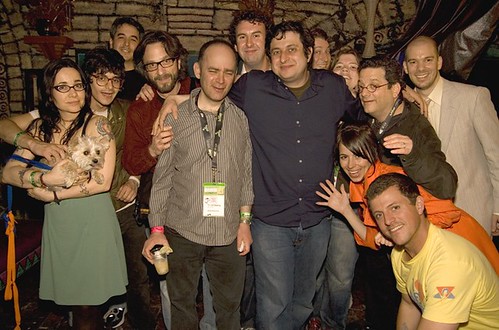That said, you'll be in for a rude awakening when you get here. Comics who are really cooking in, say, Seattle come to NYC and find that they pretty much have to start over. That can be a tough thing, to go from doing sweet gigs in front of real audiences to schlepping from one open mic to another where you're performing only for comics who don't give a fuck.
Also, you'll probably have to dump a lot of your material. Jokes that work on the road or in other cities can crash hard in NYC. The plus side to that: I think if you can kill here, you know you've got strong material. I feel like the talent level of other comedians and the savviness of audiences here really push you to come up with stronger material than you would otherwise.
After you move here, then what? Well, it helps if you've got friends here already. Being hilarious is a good start, but having people who can hook you up with spots and vouch for you to others can help you skip ahead and save months of grunt work. Still, you'll probably need to perform wherever and whenever at first.
And then there's the whole social aspect of being a comic. Being "on the scene" is cheesy sounding but it is the best way to get spots and get known.
Derek Sivers is a guy who advises musicians but I think a lot of his advice applies to comics too. In Advice for a 19-year-old guitarist who wants to be a session musician, he talks about the importance of social skills:
Commit yourself to learning the social skills needed to be the guy that people call. It means a few hours a day of meeting everyone you can, being around the studios where people are hiring session musicians, being a good listener, being positive and helpful, keeping in touch, etc.
(I made a living as a session musician in NYC for a few years. I’m a good guitarist, but I swear the reason I kept getting called is I would find a way to appreciate whatever crap they played me, telling them that it’s awesome. It was a white lie but a good one, because people can be really insecure in the studio, and need encouragement.)
Be humble and constantly learning, understanding you’ve made a many-year-long commitment to mastery. Some may scoff at you for being the new kid in town, so agree with them, respect their experience, and make sure they know you’re committed. So few really are, that you’re sure to stand out.
Just translate that to comedy and it's equally good advice. Go to all the shows, listen to people, be positive, leave witty comments on people's Facebook accounts, tell someone when you like one of their bits, and show that you're really committed to it. Do that for long enough and people notice.
And constantly get more hilarious. The best thing you can do is be undeniably good.






